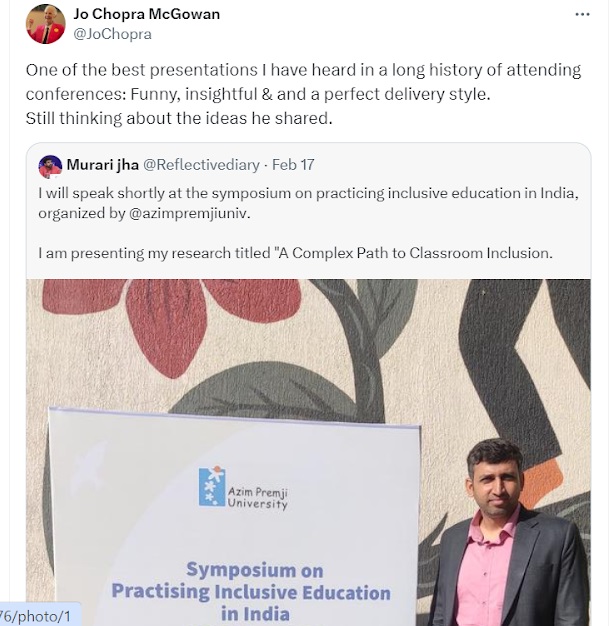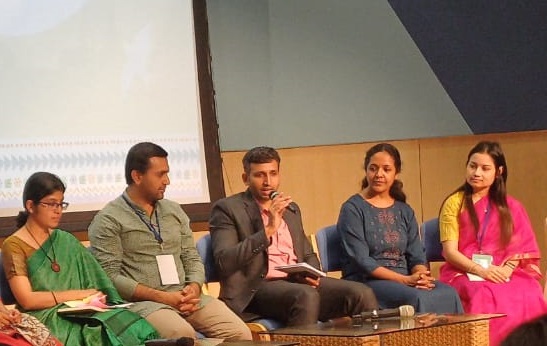
Towards a More Inclusive Future: Reflections on Inclusive Education Symposium
Last week, I had a wonderful opportunity to participate in the symposium titled "Practicing Inclusive Education in India: Listening to the Discerning Voices." This was an opportunity to come across the wonderful work a handful of people are doing in this particular domain; the passion and commitment to the field were inspiring. It was a conglomeration of both practitioners and people who advocate for the policy. Meeting people from organizations like Umeed, Latika Rai Foundation, 4th Wave, Brindavan Trust, Teachers Collective, Pecta, and so on affirmed my belief that serious researchers and practitioners are working to promote inclusivity in society, and of course, education is one of the finest channels to achieve it. My participation in the symposium was quite inspiring for me; some very interesting questions were asked, including how to measure the practice, which I have introduced in terms of the achievements that children make. Some colleagues shared that even the M.A. students do not write well. How do you make school children write on an everyday basis? And so on.
The feedback from the stakeholders in the field was really encouraging for me. I would particularly like to thank Dr. Miriam, a professor at APU, for her encouragement to see my work in print. Jo Chopra McGowan, from Latika Rai Foundation, for writing, "One of the best presentations I have heard in a long history of attending conferences: Funny, insightful, and a perfect delivery style. Still thinking about the ideas shared." Vibha Krishnamurthi, Founder of Ummeed Child Development Centre, for introducing me to her team and for encouraging words. Dr. Ankur Madan, Director of the School of Education, APU, and Madhusudan Ramesh for creating this opportunity. It would be incomplete without mentioning the amazing students of Azim Premji University who approached me after my presentation and asked so many questions, demonstrating their curiosity in the work that I am doing.

In my address to the audience, I drew attention of the researchers on why we do not have the word "inclusion" in our Preamble, which is considered one of the finest documents that encapsulate the dream of India that we all aspire to make a reality. I also highlighted that perhaps the founding fathers were more focused and closed with the idea of equality, which is broader, and we need to see how we have transitioned from debating on a larger idea like equality to inclusion. This appears to be a modern concept that fits with the iniquitous nature of our society's politics and economy. It doesn't challenge the status quo; it simply demands to ensure inclusion. Let's suppose we cannot provide everyone with a seat on a train; then we have the provision of a general bogie so that everybody can board and travel but cannot claim to have a seat. That's how inclusion looks like. It may reassure the passenger that at least they are on board, whereas equality will demand a seat for every passenger traveling on the train, like an airplane where there is a seat for every passenger. Of course, it is costly, but it is related to the dignity of the people, and in a just society, we must see inclusion as an extension of equality, not at the cost of equality.
The paper I wrote for the symposium also argues how we can look at the idea of inclusion beyond accommodating differently-abled children in our educational institutions. This idea has to be viewed in a broader sense, in a sense that it's a matter of basic rights for everyone to feel belonged. Whether a person is able or disabled, it's also about accommodating people from socio-cultural diverse backgrounds. As long as we do not promote it as a matter of concern for everyone, we will continue to lose ground. Inclusion is for everyone, not only for disabled persons. In educational institutions and elsewhere, we continue to see how people coming from certain castes, classes, genders, religions are not accommodated. The debate on inclusion has to include all these layers of intersectionality.

I also spoke about my research and how it promotes inclusive practice in the classroom. The "One Page Revolution," the term that I find apt to describe my research, requires every child in the class to write a page every day, and those write-ups by the children are used as the chief material for discussion in the class. This not only democratizes knowledge construction in the classroom but also promotes inclusive practice, where every child has the opportunity to participate in knowledge construction, irrespective of the socio-cultural identity they carry with them. Rather, they can bring it for discussion through their write-ups.
A part of my presentation was also devoted to the challenges of methodology that practitioners face. One major challenge that practitioners in the field face in communicating their work to academia is that of methodology. Like in any other field, the field of research, and particularly when it comes to methodology, is full of stereotypes. Often, practitioners tend to limit themselves to action research as if to solve problems that they face on a day-to-day basis, while thinking that theoretical issues are the domain of people who are not in the field. I challenge this. Perhaps it’s the practitioners who can better think about larger theoretical problems and construct them. It is very likely that when practitioners engage with methodological issues, they will develop new ones. I presented my work as a methodological one which heavily draws from the larger domain of autoethnography.
I think many such spaces need to be created where researchers and practitioners can come together to deliberate on the issues of inclusion and extend its boundaries to include everyone because it's a matter that relates to each one of us. It's a matter of dignity, and who doesn't need it.
- Log in to post comments
